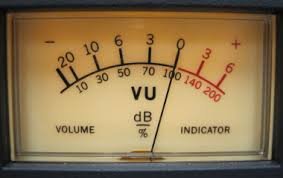For me, the biggest part of living successfully with Aspergers is managing my energy levels.
This is how I experience it.
ENERGY LEVELS
Imagine an old fashioned analogue volume meter. Any reading from minus 10 to 0 means I have a good, maintainable energy level which allows me to work, socialise, and be functional in life. That central belt of numbers represents the ideal maintainable area for energy levels.

Between -10 and -6 is at peace, but not energised. At this level I can only handle a limited amount of socialising, preferably entirely non-demanding, with people I know well.

Between -6 and -3 is at peace, with a moderate amount of energy. Able to handle a bit of the unexpected, able to be reasonably sociable and upbeat.

Between -3 and 0 is at peace with myself, and possessing quite a lot of energy, social skills are pretty good at this point. Able to roll with the punches of life a lot better.

Any reading lower than minus 10 means I have low energy. This means I feel fatigued, anxious, unsettled, and am unspeakably awkward socially. It means I can't think clearly or remember things, and am generally very close to being socially at my worst. If I stay at this level for too long I tend to screw up relationships.

Any reading lower than minus 20 is total Asperger's shutdown. I have no option but to completely withdraw socially, ideally lie down in a cool, dark, tidy room and maybe read a novel to allow my conscious brain to be occupied while my catastrophically depleted resources slowly rebuild themselves.The rebuilding process can take anything from 4 hours to a week, depending on the damage level. I cannot be around any people at all at this point.

Any reading over 0 means I am high energy. This is me at my best and most charismatic. It doesn't happen very often, and when it does, it is not maintainable for long, and it ALWAYS presents its bill shortly afterwards. However, for the short time I am up in the positive numbers I am capable of being quite an exciting person to be around. I am able to act like a master of many of the more subtle social skills - flirting with the opposite sex, spontaneously cracking jokes that make the group laugh, thinking at light-speed and generally feeling great about my life, myself, the universe and everything.

DIET
The biggest single influencer of my default energy level is my diet (blood-sugar being a huge factor). I generally eat very low carb (under 40g of carbs a day) largely because it keeps my moods stable. When I eat carbs, my energy levels tend to swing up into the red after eating, and then plummet below minus 10 - especially if I've been eating bread / sugar / white carbs. This always eventually ends up with me having to eat a ton of sugary sweets to keep me out of the minus 10's, and my weight ballooning. Which in turn knocks my self esteem down, making me want to eat more.
So naturally, as I don't particularly like having the weepy-shakes after eating a meal, or living a life of wild mood-swings, I prefer to stick to low carb on a daily basis.
When eating low carb, my resting default energy level is somewhere between -10 and -6 on the volume meter. This does not give me alot of energy to spend on the day, and after a day's work, it can sometimes dip below -10, leaving me pretty knackered and sleepy. So on any given normal day, this is where my body seems to want to rest - at a point where I basically feel fine, but have only a small amount of inner resources to spend - and if I spend them, I feel pretty tired pretty quick.

Obviously, as a working man, staying permanently in this fairly low energy state is not ideal. I have all kinds of hopes, plans and ideas I would like to implement, but which require energy. Thankfully, there is a way to get some.
POWER-UPS

One major bonus of the low carb diet is that you are allowed black coffee. It contains close to zero calories, tastes amazing if you get it from the right place (not Costa or Starbucks in my probably-less-than-humble opinion) and if you drink a large cup of a pretty strong brew, as I do, it functions as a massive boost to energy levels. Most days I start the day with a massive black coffee (I recommend Taylors of Harrogate praline especial brazil), which automatically shoves me up a couple of notches on the volume meter.

I will often have a second large cup mid afternoon when I feel my energy levels start to dip, which keeps me moving at a good pace, keeps my head clear, and keeps me doing a decent job with my work.
As the days go by, the effects of drinking two large cups of back coffee each day are cumulative, and after a little while, my body is regularly running between -3 and 0 on the volume meter every day. It doesn't take long - a few weeks into the 2-large-coffees-a-day habit I always eventually experience a few days of feeling excellent, on top of the world, where I can seemingly do no wrong, and all Aspergers issues are firmly swept under the rug.

The body, however, starts to flash little warning signs after a little while, when the indicator on the volume meter starts to tick over the 0 mark into the positive numbers. When the cumulative effect of a few weeks of two coffees a day starts to push the volume meter into supercharged mode, it is so enjoyable, intoxicating, addictive... and dangerous.

Running not below but above the central 'safe-area' on the volume meter is heady, but expensive. It is like burning the candle twice as brightly, at both ends, with a blowtorch. To remain functional in the positive numbers, in the red-zone, it costs inner-resources at extortionate APR, I soon begin slipping in and out of my energy-overdraft, so to speak. I invariably find, after a short while (say a week or so) of running at full tilt, I start to get these odd twinges of panic - these flashes of anxiety, or sudden lapses into depression that seem to come from nowhere. And if I ignore these little messages for long enough, the meter starts flashing from +6 to -20, from top to bottom, with really serious mood swings, from feeling fine to feeling like I could go mad. The smallest provocations can set off a mini-explosion.
At this point, it's time to stop the coffees before I do major, serious, long-lasting damage to one of my friendships/relationships. It's time to take a couple of days where I accept being low energy for the sake of letting my brain and energy levels stabilise again, and I retreat into my man-cave, take a weekend where I do no work at all, drink no coffee at all, relax, indulge myself a bit, and sleep a LOT.
And after that? I usually start the process over again.

SO WHY DRINK COFFEE AT ALL?
It's a good question. Why put myself through climbing the same mountain over and over again? Why keep pushing myself to the point where I'm wired out of my head and starting to split at the seams?
Well, simply put, it's because I'd rather have SOME experience of being alive, awake, charismatic, persuasive and funny than none at all - and if I don't amp myself up, I spend my whole life hovering around the -10 point on the meter, de-energised, introverted and quiet. As far as I know, I only get one crack at life, so I want to spend as much of that time as possible being someone I'm proud of, and someone other people seem to like being around too.
I am always tinkering, always calibrating, always finding other little tips, tricks, hacks and adjustments that can be made to improve this strange system, to manage my energy levels and stay upbeat and in command for longer periods in a more stable manner, but to quote Q from the James Bond film Skyfall, it's like trying to crack a rubiks cube that's fighting back.
But I've found that thinking about, analysing, and growing in understanding of my energy levels and how they affect my life has absolutely revolutionised my experience of life on a day to day basis as an autistic person, and if you're autistic too, I'd encourage you with all my heart to start training your brain to focus on and analyse your own energy levels too, because if there's one thing I've learned since my diagnosis, there is no puzzle anywhere that cannot be cracked. Good luck :)


